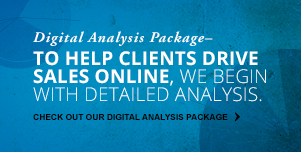
Sean Doyle
Sean is a principal at FitzMartin, and our leading mind and voice on sales and marketing strategy. Sean is particularly adept at applying the science of behavior change to the art of sales and marketing. It’s an approach that he and FitzMartin have developed over thousands of client engagements since 1992.
Never miss a post
Subscribe below to receive blog updates.

In my last post about driving B2B sales through social media I declared:
“Everyone has an opinion about the value of social media, particularly in the B2C realm. But for B2B practitioners, good social media advice is more complex. There are many more nuances involved in terms of audience (multiple layers of decision-makers), complexity of product/services and sales cycle (a B2B purchase usually has a longer gestation period). Regardless of context, there are more ways to fail at social media than succeed. There’s much risk in the wrong approach.”
In balance, I also said: “start today”
…and the place to start? Look (well, really listen) before you leap! As with many of your research efforts, an effective social media strategy starts with listening. Begin by monitoring the social media landscape for anything that might even be slightly relevant to your business. For example, if you sell SCADA controls for food manufacturing plants, you then monitor for regulatory changes or feedback in the end-user industry or OEM forums across the country. If your business serves a narrow vertical market (like multinational food conglomerates with new construction and consistent standards around the globe), then listen for particular needs within that niche.
Listen to what the marketplace emphasizes, in the aggregate, when discussing a particular topic, service or strategic decision. Listening can be a helpful arrow in your lead generation/qualification quiver. You can use social media sentiment to track prospects as they move through the buying process. This framework can be based on the questions they ask or the dialogues in which they participate.
Specificity > Scale
B2B success in social media is not about scale, but specificity. It’s not about your number of “followers,” “likes” or “friends.” It’s about conversions.
Traffic to your blog is the first step, the next is conversation of that anonymous web traffic to a small exchange relationship: they share a bit of personal info (their name, perhaps an email address), and you give them something in return—content, insights a diagnostic tool, whatever. From that moment, you have a lead that can become a customer, if it’s a fit. But it’s up to the customer to move forward and offer their name. It’s then up to you to be a decent human and not overwhelm them with sales-driven eagerness after they took a risk and gave it to you.
On the subject of these small exchange relationships. We have all been annoyed or regretful when we’ve shared our email address. I recently got an earful from my wife because a sales associate asked for her email, and we shared it, when purchasing a pair of shoes from Cole-Haan. WOW is she sorry, and me too. She is getting 2 or 3 emails a week with deals offers and updates. ARGHHH. All we wanted was a pair of shoes and a receipt. Her attempts to unsubscribe are not working, either. So are either of us likely to buy another pair of shoes from them? (Oh, but I do love the shoes.) We’ll certainly be wary if we make another purchase, and I promise you if we ever get off the email list we will never give it again.
Social media networks, like email, are venues that value authenticity, transparency and personality. Those attributes also happen to be at the root of offline B2B sales. Resist the temptation to see social media marketing as a mere numbers game. After all, you know that the key to success isn’t in the number of customers, but the value of your customers. Like most B2B firms, you have a small customer base of high value. Too, your market is complex: Often, you have to communicate multiple value propositions to multiple decision-makers in multiple departments. B2B marketing is truly “one-to-one” marketing.
- The number of businesses that say Facebook is critical to their business has increased by 75%
So start, but also start by listening.
To read the beginning of the conversation: http://blog.fitzmartin.com/blogging-equals-sales
Data provided by: HubSpot State of Inbound Marketing, 2012


